If you have been interested in the online education world, one thing you’ve likely noticed is that there are hundreds – if not thousands – of different courses, lessons, subjects, and categories to choose from. And while many of these courses are all well and good, many are ultimately a waste of money.
Coursera has consistently produced fantastic courses, yet there is a considerable amount to choose from even here. So much so that it can be challenging to know what to focus on. Below, I have curated 15 of the best computer science courses that you should be taking. These courses are in every area of skill, subject, and category. Check the courses below and see where you should get started on your computer programming journey.
TOP 15 Best Coursera Courses for Computer Science (With Certificates)
[wpsm_list type=”arrow”]
- Introduction to Computer Science and Programming Specialization
- Fundamentals of Computing Specialization
- Python for Everybody Specialization
- Data Structures and Algorithms Specialization
- Java Programming and Software Engineering Fundamentals Specialization
- Accelerated Computer Science Fundamentals Specialization
- Introduction to Programming with Python and Java Specialization
- Web Design for Everybody: Basics of Web Development & Coding Specialization
- Introductory C Programming Specialization
- Functional Programming in Scala Specialization
- IBM Data Science Professional Certificate
- Developing Applications with Google Cloud Specialization
- Object-Oriented Programming in Java Specialization
- Blockchain Specialization
- Web Applications for Everybody Specialization
[/wpsm_list]
Introduction to Computer Science and Programming Specialization
The Introduction to Computer Science and Programming (ICSP) course runs through the foundational basics that are vitally important to every aspect of IT and software development. In it, students are taught about Javascript, computer graphics, and the mathematical foundations that make up every computer-based aspect of our lives.
The course is primarily made for beginners in online software development, meaning you need virtually no prior knowledge or experience in any type of coding. Similarly, the course is relatively short. If you worked only 5 hours a week, it would take roughly 4 months to complete the course.
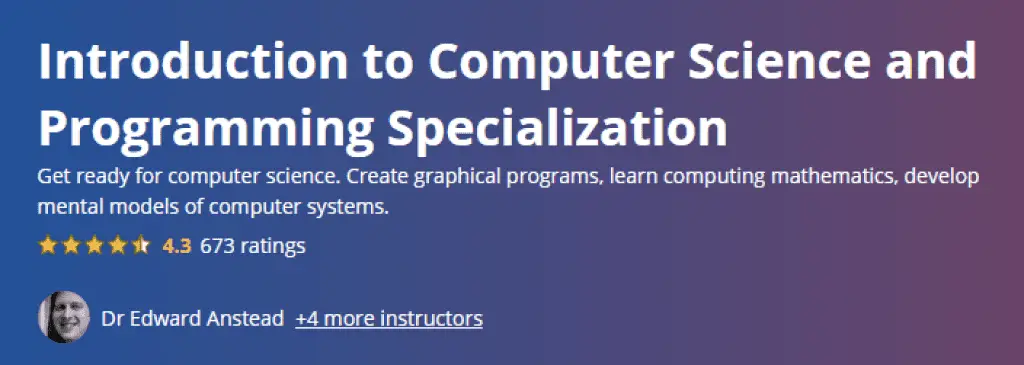
Pros:
[wpsm_list type=”arrow”]
- Great for beginners and people with no experience coding.
- Gives students a complete foundational understanding of how computers work, similar to how basic arithmetic is the foundation for all mathematics.
- Gives students practical and applicable skills that can translate to every other computer-based project or course.
[/wpsm_list]
Cons:
[wpsm_list type=”arrow”]
- Because it is covering the basics and fundamentals, don’t expect anything too particularly advanced or complex.
- You do get a certificate; however, it won’t be worth too much on its own due to the relatively low-level information covered.
[/wpsm_list]
Review: While probably not something that an expert may find appealing or interesting, if you are someone that has no idea where to start but has always wanted to get involved, this is the course for you.
Link to the course
Fundamentals of Computing Specialization
Fundamentals of Computing Specialization (FCS) is a course that advances past ICSP, going into Python coding language, and giving its students the skills needed to create simple interactive games and applications like “Pong” or “Asteroids.” Much of this course’s material is taught to first-year students of Rice University, greatly substantiating its importance.
At the end of the 7-part course, students will go through a final exam to prove that they have fully mastered these subjects. The final Capstone exam questions are periodically updated, meaning that students must really understand the information on their own merit and not through outside help.
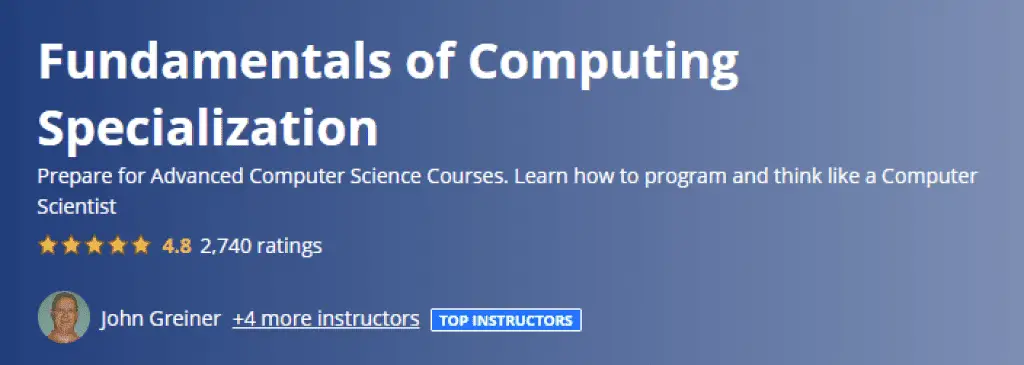
Pros:
[wpsm_list type=”arrow”]
- Great for teaching students about Python.
- It can be completed in as much or as little time as you need to master the concepts.
- In addition to understanding the various aspects of computing fundamentals, you are also given a final exam to verify you know this information.
[/wpsm_list]
Cons:
[wpsm_list type=”arrow”]
- If you know nothing about computer programming or you’re an expert, you’re not going to get a lot out of this course.
[/wpsm_list]
Review: FCS is considerably more appealing than ICSP because pretty much everyone can benefit from it. Whether you are learning this for the first time or simply need a review, there really isn’t much that isn’t great about this fundamental course.
Link to the course
Python for Everybody Specialization
Python for Everybody Specialization (PFE) is an excellent course that goes deep into learning Python, including how to use it to write programs. The course is made up of 5 parts that each go through every aspect of Python and its uses.

Pros:
[wpsm_list type=”arrow”]
- It can be completed in under a year if working under 3 hours per week.
- Has a certificate upon completion that can actually hold some merit professionally.
- Offers tons of practical application of Python, complete with a final project where it is used create an application.
[/wpsm_list]
Cons:
[wpsm_list type=”arrow”]
- The course is hyper-focused on Python. While this is excellent for newcomers, it may be redundant for those who regularly use Python or use another language entirely.
[/wpsm_list]
Review: Because Python is used virtually everywhere, knowing it is essential. This course gives a complete rundown of Python while staying very beginner-friendly for those that aren’t too programming literate.
Link to the course
Data Structures and Algorithms Specialization
Data Structures and Algorithms (DSA) course goes further in-depth with computer science and programming by focusing on an algorithm and algorithmic intuition. It pulls from many of the fundamentals in the earlier courses. In it, students will learn more about dynamic programming, linear programming, software testing, and much more.
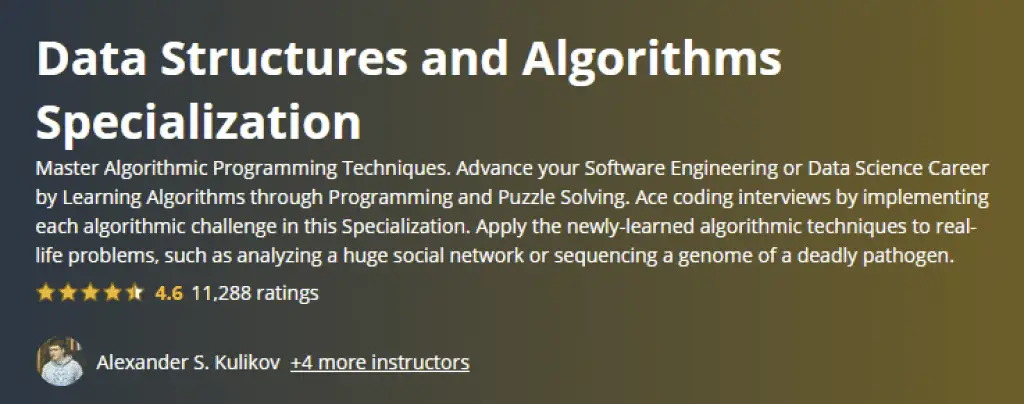
Pros:
[wpsm_list type=”arrow”]
- It is an intermediate-level course that is great for people that have a firm grasp of the fundamentals.
- Touches on various other programming scripts outside of Python, like C++, Ruby, and Scala, just to name a few.
- The course is very robust and has over 3,000 hours worth of material, ensuring that you will become an expert in Algorithms when it’s all said and done.
[/wpsm_list]
Cons:
[wpsm_list type=”arrow”]
- If you aren’t someone interested in Algorithms, it can be somewhat of a waste of a class.
[/wpsm_list]
Review: As we become more technologically advanced, this course will only grow in its importance. If you expect to get involved in the work world, this will give you a serious leg up compared to your competition.
Link to the course
Java Programming and Software Engineering Fundamentals Specialization
Java Programming and Software Engineering Fundamentals (JPSEF) goes into understanding the coding aspect of the online world. The course is very beginner-friendly, offering different foundational skills to handle real-world issues.
Because the course is focused on people with little to no experience, you can expect to finish relatively quickly. If you are willing to invest around 4 hours every week, you can expect to finish in less than 6 months.
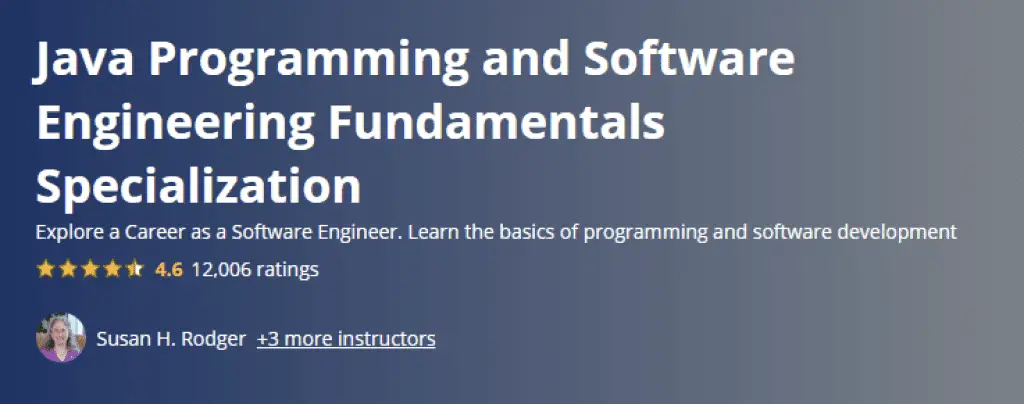
Pros:
[wpsm_list type=”arrow”]
- Pretty fast turnover time from start to finish.
- Very beginner-friendly. In fact, you pretty much don’t need to know anything before taking the course.
[/wpsm_list]
Cons:
[wpsm_list type=”arrow”]
- As with other beginner courses, it does not hold much weight as a certificate.
- If you are already trained in these areas, this can feel redundant.
[/wpsm_list]
Review: JPSEF offers its students numerous hands-on projects in addition to their classes. The course isn’t ideal for those trained with Java or are particularly advanced in the general area. However, if you are just starting out, this is one of the best courses available on JavaScript and Java Programming.
Link to the course
Accelerated Computer Science Fundamentals Specialization
One of the more intermediate to advanced courses, Accelerated Computer Science Fundamentals (ACSF), goes over algorithms and data structures like some of the earlier courses mentioned. The difference is that this course also will get into using a C++ programming language.
The course takes less than 90 days to complete if you’re working around 5 hours a week and does require students to already have some basic programming knowledge under their belt.
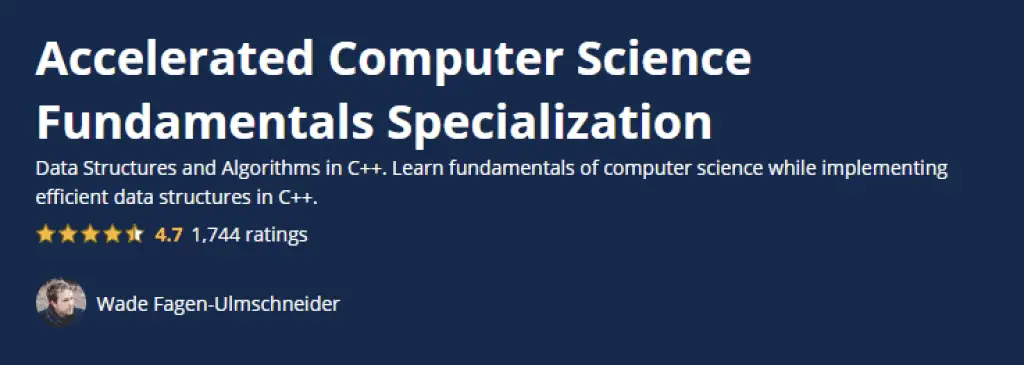
Pros:
[wpsm_list type=”arrow”]
- Offered by the University of Illinois at Urbana-Champaign
- Has only one teacher (Wade Fagen-Ulmschneider), meaning it is less hectic compared to other courses
- The course is very dense, meaning there is a lot of information without spending a year learning it.
[/wpsm_list]
Cons:
[wpsm_list type=”arrow”]
- While great for the majority of students, if you are just getting started, this may not be a bit overwhelming
[/wpsm_list]
Review: ACSF is one of the better courses available even when on this list. If you have any prior training in programming, this will be something you will greatly benefit from.
Link to the course
Introduction to Programming with Python and Java Specialization
Introduction to Programming with Python and Java (ITPPJ) is a course that goes over the foundational aspects of Python and Java code. It is an excellent option for fresh-faced beginners and has virtually no real experience coding or programming.
The course goes over many things like Python tools, Java Programming, and Python Programming, ultimately resulting in writing fully functional Java programs.
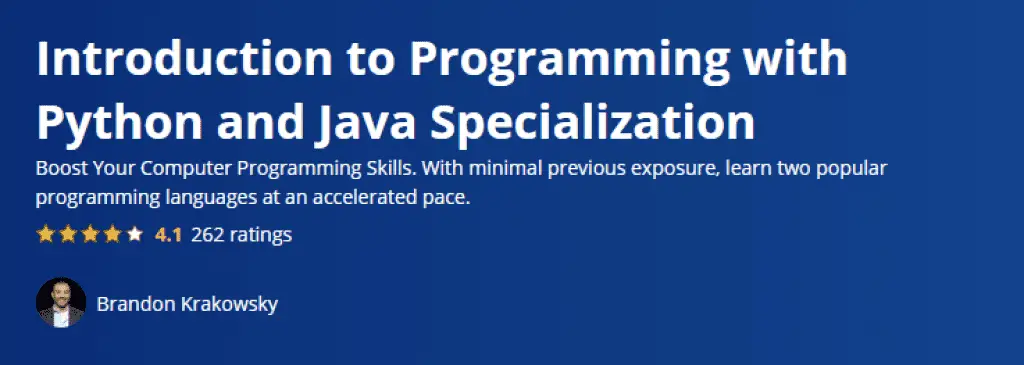
Pros:
[wpsm_list type=”arrow”]
- Very beginner-friendly. You don’t need more than some elementary, high school / college-level math
- Only takes around 4 months to complete (if at a 6 hours/week pace)
- Can produce a Certificate upon Completion that, while not great, is something employers will put some stock in
[/wpsm_list]
Cons:
[wpsm_list type=”arrow”]
- It can be a bit too simple for anyone that knows anything about coding or programming
- The Certificate offered, while something employers will look at, is only going to sway lower-ranked job positions
[/wpsm_list]
Review: ITPPJ is an excellent course for prospective coders and is definitely something every person should go through. As the title suggests, it is an introductory course that should be the start of your journey. At the same time, don’t expect this to be the last piece of training on your end if you wish to advance.
Link to the course
Web Design for Everybody: Basics of Web Development & Coding Specialization
The Basics of Web Development & Coding (BOWDC) course teaches students to design and create websites using Javascript, HTML5, and CSS3. It is a beginner-level course that covers the basics of creating a high-quality website that works on every platform (tablet, computer, and mobile device).
The course takes around 6 months to complete if you are studying at a pace of 3 hours a week and comprises 5 separate course lessons; Intro to HTML5, Intro to CSS3, JavaScript Interactivity, Advanced Styling with Responsive Design, and Web Design for Everybody Capstone.
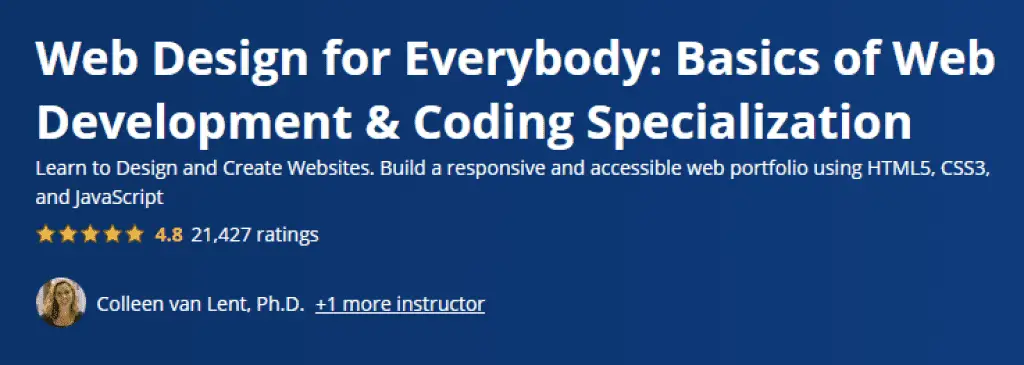
Pros:
[wpsm_list type=”arrow”]
- Great for beginners and people interested in creating a website
- An ideal fundamental course that every person should learn
- It is offered by the University of Michigan as an important course
[/wpsm_list]
Cons:
[wpsm_list type=”arrow”]
- Very specialized and focused on website building
- A bit simplistic for more advanced coders
[/wpsm_list]
Review: The thing that makes this course so ideal is that anyone can do well from it. Compared to other courses that may be more advanced or just focus on fundamental skills, BOWDC immediately gives its students an applicable skill that has very real value.
Link to the course
Introductory C Programming Specialization
The Introductory C Programming course (ICP) teaches students various essential programming fundamentals for more complex computer programming problems. This 4-part course goes over C Programming and C code and how to develop algorithms systematically.
It doesn’t require any prior experience as an introductory course and can be completed in around 5 months if working at a 5 hour per week study pace. To complete the course, students must demonstrate their skill to one of their 3 different instructors.

Pros:
[wpsm_list type=”arrow”]
- Great for beginning students that want to learn C Programming
- Offered by Duke University, making it a very important course worth acknowledging by companies
[/wpsm_list]
Cons:
[wpsm_list type=”arrow”]
- Not quite as relevant as Java or Python, while still being just as extensive
- If you are someone that knows any computer programming, this may come across as redundant at times
[/wpsm_list]
Review: While not one of the best on this list, if you wish to further extend their knowledge, master C Programming, or expose themselves to different and more complex problems, ICP is a course definitely worth your time.
Link to the course
Functional Programming in Scala Specialization
An admittedly higher level of programmer training, Functional Programming in Scala (FPIS), teaches students to write elegant, functional code. They are taught how to write valuable programs using pattern matching while also learning to manipulate data using Scala and Spark.
FPIS allows more intermediate and advanced students who already understand the basics of coding to create coding that works from the first time it is run. It is pretty extensive, taking around 7 months to complete while at a 7 hour a week study pace, and requires students to have at least a year’s worth of programming experience under their belt.

Pros:
[wpsm_list type=”arrow”]
- A very valuable course that puts its students head and shoulders above their contemporaries
- Gives a Certificate upon Completion that actually will cause an employer to take notice
- Perfect for people trying to become their best; leverages nearly all of the fundamental basics in computer programming.
[/wpsm_list]
Cons:
[wpsm_list type=”arrow”]
- It can be a bit overwhelming for some, even if they do have the established experience.
[/wpsm_list]
Review: FPIS is a very interesting course in the sense that, while not taking it won’t hurt you too severely, any person that does take it is considerably more viable to an employer. If you want to do your best and have the most options, investing your time in FPIS is, in my opinion, essential.
Link to the course
IBM Data Science Professional Certificate
If you are looking to kickstart your career authentically, taking the IBM Data Science Professional Certificate (IDSPC) course is your best bet. This course will break down precisely what data science is, as well as their job and methodology.
While students can have no prior knowledge or experience in the data or computer programming world, this course can greatly help develop the skills and portfolio needed to be picked by any company. In fact, over 20% of students began a career off of this course alone!
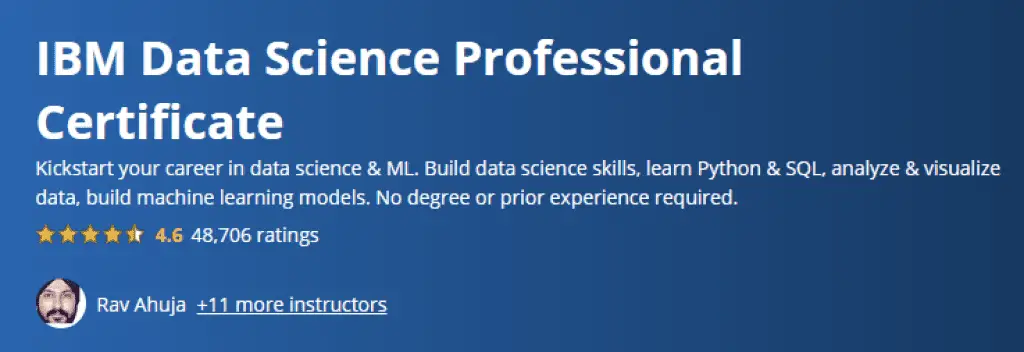
Pros:
[wpsm_list type=”arrow”]
- Requires no prior experience in data science or computer programming; extremely beginner-friendly
- Teaches students practical, real-world skills that will be used “on the job.”
- Trains students in different tools like GitHub, Watson Studio, and R Studio
- It is one of the courses most likely to interest an employer if seen on a resume or portfolio
[/wpsm_list]
Cons:
[wpsm_list type=”arrow”]
- The amount of time until completed can be a bit daunting (almost a year to finish at 3 hours a week)
[/wpsm_list]
Review: FPIS is a very interesting course in the sense that, while not taking it won’t hurt you too severely, any person that does take it is considerably more viable to an employer. If you want to do your best and have the most options, investing your time in FPIS is, in my opinion, essential.
Link to the course
Developing Applications with Google Cloud Specialization
Offered by Google Cloud Training, Developing Applications with Google Cloud (DAWGC) is a comprehensive course that teaches students how to design, develop, and deploy various apps onto the Google Cloud Platform (GCP).
The course goes over some best practices for developing cloud-native applications and identifying the value and purpose of a GCP product or service.

Pros:
[wpsm_list type=”arrow”]
- An exceptional course that pretty much everyone needs to know in 2021.
- If worked at a 14-hour per week (2 hours per day) pace, it can be finished in less than a month
- Fairly easy to jump into, provided you have even a bit of related experience
[/wpsm_list]
Cons:
[wpsm_list type=”arrow”]
- While very useful, that is more to do with the fact that Google is virtually everywhere; this course is not great for anything outside of dealing with Google and Google Cloud.
[/wpsm_list]
Review: Even if you aren’t a super fan of Google or Google’s services, the fact of the matter is that it is prevalent in every part of our lives. Mastering this course not only puts you in a prime position for an employer but also sets you up for the future, where GCP will become even more of a factor in our day-to-day life.
Link to the course
Object-Oriented Programming in Java Specialization
Object-Oriented Programming in Java (OOPIJ) is a specialization course that helps software developers solve complex programming problems using Java. Students are taught how to program with graphical user interfaces as well as how to create different programs that deal with large amounts of data, making it applicable around a broad range of industries and businesses.
While no experience is required to get started, it is recommended that students know at least one other programming language. Understanding Python, JavaScript, or C is ideal as it adds context to the course information. You can expect to finish in around 5 months while working at a pace of 6 hours per week.

Pros:
[wpsm_list type=”arrow”]
- Offered by Duke University and UC San Diego, two highly respected universities in the country
- Gives students a full breakdown of Java programming through object-oriented designs
- Great for people that want to gain additional computer language knowledge
[/wpsm_list]
Cons:
[wpsm_list type=”arrow”]
- While very useful in many areas, it acts more as a supplement to other courses rather than as something viable all on its own
[/wpsm_list]
Review: Despite not being a course that is particularly great on its own, if you pair this with many of the others on this list, you put yourself in a dramatically appealing position, both from a knowledge-based and employment-based place.
Link to the course
Blockchain Specialization
Popularized thanks to Bitcoin and other cryptocurrencies, blockchains have become the next frontier in technology that is quite unprecedented. This course trains students on how blockchains work and how to design and implement a smart contract. This course also goes into Solidity language, showing how to design, analyze, and fully code a blockchain.
Because the course is dealing with fairly advanced topics, students are expected to come in knowing at least one high-level programming language as well as other foundational and basic programming concepts. In terms of time, if worked at a 4 hour a week pace, you can expect to complete the course in no more than 4 months.

Pros:
[wpsm_list type=”arrow”]
- Trains you in blockchain and blockchain-solutions
- Goes over smart contracts, decentralized applications, and different blockchain platforms, so you have a complete understanding of the programming.
- Puts you in the driver’s seat when it comes to understanding one of the most innovative things to have ever hit the internet
[/wpsm_list]
Cons:
[wpsm_list type=”arrow”]
- It is not for beginners. If you don’t know much about blockchains outside of what Elon Musk says, you may need to do more work before tackling this.
[/wpsm_list]
Review: Currently, this course may not be a requirement. However, like Python or Google are virtual requirements today, the same will be true for Blockchains as they grow more popular. If you expect to stand out on the market for prospective employers, already having this quiver in your hat is something you can’t really afford to ignore.
Link to the course
Web Applications for Everybody Specialization
If you are someone looking to build and create incredibly dynamic websites backed by a robust database, Web Applications for Everybody (WAFE) is worth considering. This course teaches students to use JavaScript with PHP web apps, develop PHP and MySQL applications, and build a website from the ground up.
Students are required to understand some computer-based programs before starting this course as well as ideally know a programming language. The 4-part course is offered by the University of Michigan will take around 6 months to complete at a pace of 5 hours per week.
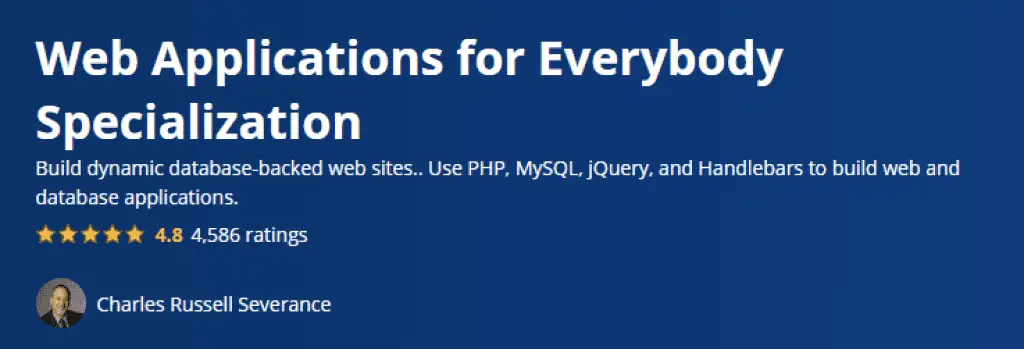
Pros:
[wpsm_list type=”arrow”]
- Gives students a solid and applicable understanding of HTML, PHP, JavaScript, SQL, and CSS
- Allows students to handle increasingly tricky websites, making them indispensable as society continues to grow and expand.
[/wpsm_list]
Cons:
[wpsm_list type=”arrow”]
- Strictly focused on the website aspect of computer programming. If you are looking for areas outside of this, you may want to look elsewhere.
[/wpsm_list]
Review: As more and more of our interactions are happening online and sites become more complex and intuitive, people trained in running these sites will only become more essential. Getting that much-needed headstart will make you a much more viable prospect than all of your other contemporaries.
Link to the course
Conclusion
There are many areas of focus when it comes to online programming and coding development. However, that doesn’t mean you need to wander around aimlessly. By making a decision on where you want to focus and choosing a field that most appeals to your ultimate goals, you can set yourself up for success in a very short period of time.
Take a look at these 15 courses and decide which appeals to you most based on your current ability and what you are most interested in. Then, take action and get started.

